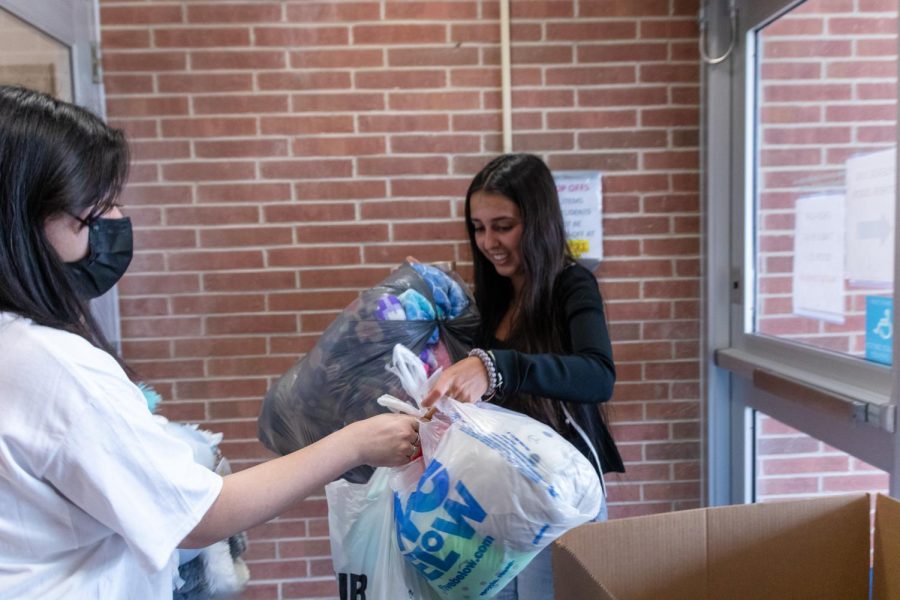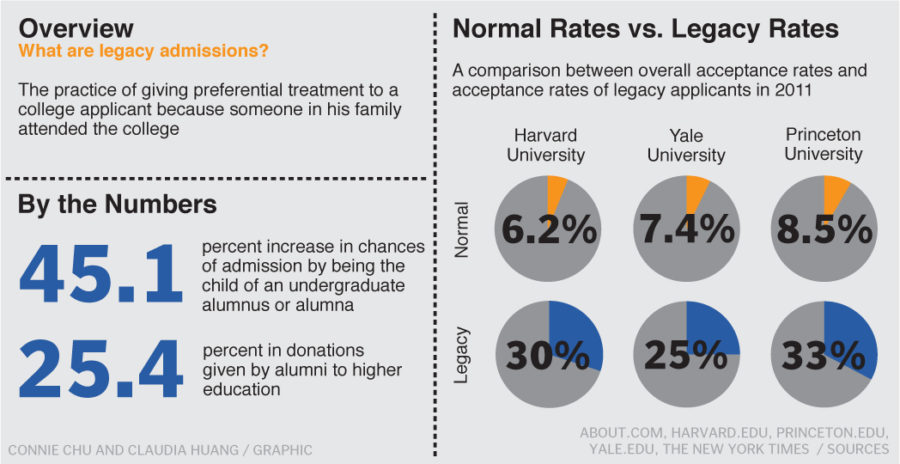Senior Rebecca “Becca” Meltzer received an acceptance letter from Emory University, located in Atlanta, this April. When she opened her acceptance letter, though, she was slightly surprised by the writing awaiting her.
“In my acceptance letter, (the university) mentioned several times they hoped that I would continue the legacy at Emory,” she said. “So obviously they knew that I was a legacy there; my dad went there. They seemed to stress that in the acceptance letter.”
While it was an exciting moment for her, she said she would have enjoyed the acceptance more if that information were withheld from her.
“I don’t think I should have an advantage over others because my dad went there,” she said. “Even though it’s a good thing that I got in, it would be even more satisfying to know that I got in on my own.”
According to a 2011 study conducted by the Harvard Graduate School of Education at 30 highly selective colleges, legacy applicants continue to gain a large advantage over non-legacy applicants. Those with a family connection to the university have seven times the chance of gaining acceptance to the school. Also, on average, legacy applicants get an advantage equivalent to a 160-point boost on the SAT, according to The New York Times. This practice, which began after World War I, has gradually become a controversial tradition, even seen as “affirmative action for the rich” by its harshest critics.
According to college and career counselor Harry Pettibone, legacy preferences still occur mainly because of financial benefits the university receives. Alumni are typically the primary donors to a university’s endowment fund.
Pettibone said, “It keeps the alumni happy and the alumni are usually contributors financially to the school. So the bottom line (is) to keep the income flowing.”
Also, another reason why colleges are so willing to accept legacy applicants is because of the idea of tradition, according to Meltzer.
“I think they like to have traditions of families at the college. It definitely looks good for them to say that they have a large alumni population,” Meltzer said.
In addition, the fairness of legacy admissions has been questioned. Meltzer said she did not agree with legacy preferences and found those preferences to be unjust.
“I don’t think (admission) should have anything to do with the parents. Getting into college is based off of what the students have done, not what the parents have given to the colleges,” Meltzer said.
However, while Pettibone said he agreed preference for legacies is an unfair practice, he also said it will not be eradicated anytime soon.
“I don’t know if it’s fair, but it’s realistic. I think I would look at it that way because the colleges have to sustain themselves, and what better way to do it than to keep the supporters in line,” Pettibone said. “But the unfairness comes if Susie or Johnny got a 2.5 and gets admitted over a non-legacy with a 3.8. There are pros and cons to (the practice).”
Despite the advantage that legacy hopefuls gain when applying, students do not normally show a preference for the school, according to Pettibone.
“Usually, if mom and dad are alumni of a highly selective school, students will probably look at those schools, but it’s more prevalent for parents to say to students, ‘Well, I went there and liked and enjoyed it, but the choice is yours,’” Pettibone said. “And that’s how I think that’s the way it should be. Yeah, follow suit with mom or dad, but you are your own individual and you have your own choices.”
Sophomore Tyler Meinz is an example of someone who could potentially be subject to the benefits of legacy preferences because his father went to Princeton University, located in Princeton, NJ. However, regardless of this, Meinz said he has not considered the school as one of his main choices.
Meinz said, “My dad told me to go to a school that I want to major in. And although Princeton’s a great school —everyone knows that—it’s not something that I’m looking into that much right now because it’s more of an economics and engineering school. That’s what it’s mainly known for. And I’m looking into kinesiology, and so he said to find a great school in that.”
While Meltzer has decided to attend Vanderbilt University in Nashville, TN, in the fall, she said she was seriously considering Emory University as one of her potential options. When she was making her college decision, she said she tried to remain impartial to all of her choices.
“I think (the fact that I am a legacy applicant) will affect my choice a little bit just because (my dad) obviously is pushing it a little bit because he liked (Emory) so much,” Meltzer said. “And also, because he knows a lot about it, it’s easier to be informed about the college. But I’m trying to be neutral about (my choice) and not have a leaning towards (Emory) because he went there. I want to make the decision on my own without that influencing me.”


































![British royalty are American celebrities [opinion]](https://hilite.org/wp-content/uploads/2024/03/Screenshot-2024-03-24-1.44.57-PM.png)


















![Chelsea Meng on her instagram-run bracelet shop [Biz Buzz]](https://hilite.org/wp-content/uploads/2024/04/IMG_2446-1200x838.jpg)
![Review: Quiet on Set: The Dark Side of Kids TV is the long awaited exposé of pedophilia within the children’s entertainment industry [MUSE]](https://hilite.org/wp-content/uploads/2024/04/unnamed.jpg)
![Review: “The Iron Claw” cannot get enough praise [MUSE]](https://hilite.org/wp-content/uploads/2024/04/unnamed.png)
![Review: “The Bear” sets an unbelievably high bar for future comedy shows [MUSE]](https://hilite.org/wp-content/uploads/2024/03/unnamed.png)
![Review: “Mysterious Lotus Casebook” is an amazing historical Chinese drama [MUSE]](https://hilite.org/wp-content/uploads/2024/03/0.webp)
![Review in Print: Maripaz Villar brings a delightfully unique style to the world of WEBTOON [MUSE]](https://hilite.org/wp-content/uploads/2023/12/maripazcover-1200x960.jpg)
![Review: “The Sword of Kaigen” is a masterpiece [MUSE]](https://hilite.org/wp-content/uploads/2023/11/Screenshot-2023-11-26-201051.png)
![Review: Gateron Oil Kings, great linear switches, okay price [MUSE]](https://hilite.org/wp-content/uploads/2023/11/Screenshot-2023-11-26-200553.png)
![Review: “A Haunting in Venice” is a significant improvement from other Agatha Christie adaptations [MUSE]](https://hilite.org/wp-content/uploads/2023/11/e7ee2938a6d422669771bce6d8088521.jpg)
![Review: A Thanksgiving story from elementary school, still just as interesting [MUSE]](https://hilite.org/wp-content/uploads/2023/11/Screenshot-2023-11-26-195514-987x1200.png)
![Review: When I Fly Towards You, cute, uplifting youth drama [MUSE]](https://hilite.org/wp-content/uploads/2023/09/When-I-Fly-Towards-You-Chinese-drama.png)
![Postcards from Muse: Hawaii Travel Diary [MUSE]](https://hilite.org/wp-content/uploads/2023/09/My-project-1-1200x1200.jpg)
![Review: Ladybug & Cat Noir: The Movie, departure from original show [MUSE]](https://hilite.org/wp-content/uploads/2023/09/Ladybug__Cat_Noir_-_The_Movie_poster.jpg)
![Review in Print: Hidden Love is the cute, uplifting drama everyone needs [MUSE]](https://hilite.org/wp-content/uploads/2023/09/hiddenlovecover-e1693597208225-1030x1200.png)
![Review in Print: Heartstopper is the heartwarming queer romance we all need [MUSE]](https://hilite.org/wp-content/uploads/2023/08/museheartstoppercover-1200x654.png)






















![Review: Ladybug & Cat Noir: The Movie, departure from original show [MUSE]](https://hilite.org/wp-content/uploads/2023/09/Ladybug__Cat_Noir_-_The_Movie_poster-221x300.jpg)

![Review: Next in Fashion season two survives changes, becomes a valuable pop culture artifact [MUSE]](https://hilite.org/wp-content/uploads/2023/03/Screen-Shot-2023-03-09-at-11.05.05-AM-300x214.png)
![Review: Is The Stormlight Archive worth it? [MUSE]](https://hilite.org/wp-content/uploads/2023/10/unnamed-1-184x300.png)




